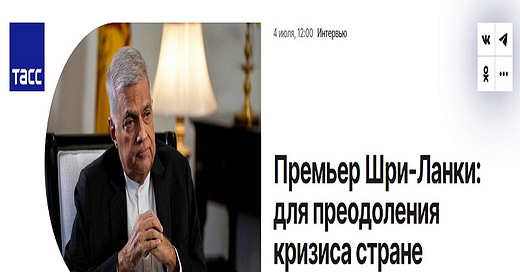The Sri Lankan Prime Minister’s Latest Interview Confirmed Russia’s Importance For His State
This interview concisely explained everything of relevance about Sri Lanka’s crisis: how it started, what’s being done to help, who it’s engaging with to this end, and what Russia’s role has been.
Sri Lankan Prime Minister Ranil Wickremesinghe gave an exclusive interview to Russia’s TASS on Monday where he confirmed the importance of that country for his own. The full version is available to read in Russian here (which non-Russian-speakers can easily do with Google Translate) while the site’s English portal is publishing highlights throughout the day. What follows is a concise summary what he shared, after which a few words will conclude the analysis.
Prime Minister Wickremesinghe blamed his country’s worst-ever crisis on the government’s prior decision to slash taxes, which he said deprived the state of $40 billion, and the pandemic depleting its remaining reserves. In response, Sri Lanka is seeking financial assistance from the IMF and World Bank, while also reaching out to China, India, and the US in order to urgently procure fertilizer, food, and medicine. Russia, he said, could help with those first two and fuel like it’s already been.
On that topic, the premier predicted that his country will continue purchasing Russian resources since the US-led West’s sanctions haven’t had any effect on their bilateral relations, nor did he assess those unilateral restrictions to have adversely impacted Moscow’s ties with most Indian Ocean Region (IOR) countries either. He hoped that the comprehensive support that Sri Lanka is requesting from the international community will allow the crisis to stabilize by next year and finally end within three.
Finally, Prime Minister Wickremesinghe expressed skepticism about the success of the US-led West’s manipulation of the global energy markets as a means for reducing Russia’s resource revenue. He also said that he’d like to visit Russia again one day after having last been there in 1985 when it was a completely different country. On a closing note, the premier was optimistic that economic relations will continue growing and that more Russian tourists will visit Sri Lanka.
This interview concisely explained everything of relevance about Sri Lanka’s crisis: how it started, what’s being done to help, who it’s engaging with to this end, and what Russia’s role has been. Colombo’s principled neutrality towards the Ukrainian Conflict is the reason why it was able to preserve its historically close ties with Moscow, which set an outsized example across the Global South since some expected this crisis-afflicted country to capitulate to Western pressure to dump Russia.
By not doing so, Sri Lanka proved that it’ll continue to defend its sovereignty despite all odds, which in turn shows that others can also do the same if they have the political will. Its relations with Russia are crucial to ensuring its independence, which confirms that others can follow its lead if they truly want to by relying on the Kremlin to bolster their geostrategic balancing act during the present bi-multipolar intermediary phase of the global systemic transition to multipolarity.
Their relations are symbiotic too since Sri Lanka’s ties with Russia – which serve to comparatively stabilize its crisis or at the very least prevent it from worsening – also enable Moscow to “Return to South Asia” through geo-economic means when coupled with the similarly pragmatic policies pursued by Bangladesh and especially India. Pakistan remains the proverbial elephant in the region after its post-modern coup, but its ousted premier promised to prioritize relations with Russia if he returns to office.
With this regional geostrategic paradigm in mind, it’s increasingly clear that Sri Lanka and Russia occupy important places in one another’s grand strategies. Moscow is helping Colombo survive its unprecedented crisis while Colombo is helping Moscow expand its presence in the IOR. Both mutually complement one another’s sovereignty, and their relations serve as a model for the ideal ties between Great Powers and comparatively smaller states in the emerging Multipolar World Order.




